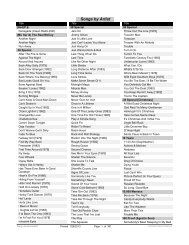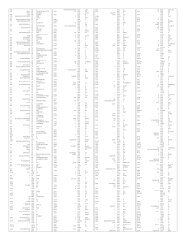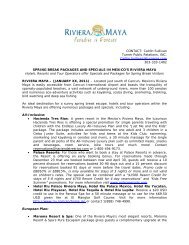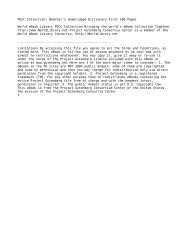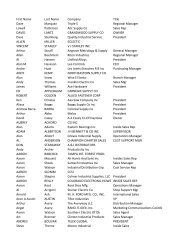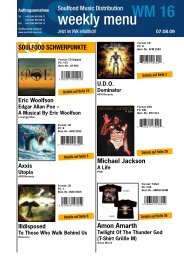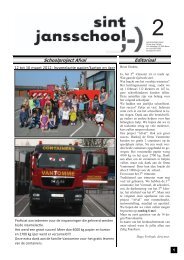- Page 1: MFNA Cultural SatirebyJeffrey Alan
- Page 6 and 7: spontaneously clever and self assur
- Page 8 and 9: 2 - The Michael Jackson ProblemOur
- Page 11 and 12: there. You know she be spyin’ to
- Page 13 and 14: “I know,” Dave looked both of u
- Page 15 and 16: I was convinced that I was fated an
- Page 18 and 19: somehow grabbed a man’s car keys
- Page 20 and 21: What had I done? I’m going back t
- Page 22 and 23: performance training. I opened my w
- Page 24 and 25: “They go into extra innings and t
- Page 26 and 27: “Tito. We were just talking about
- Page 28 and 29: lost a seventy-five thousand dollar
- Page 30 and 31: forecast for the automated AM Count
- Page 32 and 33: I could already see that “Inna-Ga
- Page 34 and 35: “Don’t know,” he said, “Sou
- Page 36 and 37: He continued, “We got some trade
- Page 38 and 39: “Yeah Ron,” since I had the wee
- Page 40 and 41: 6 - Michael Jackson’s Hoedown of
- Page 42 and 43: “….large sums of cash, jewelry,
- Page 44 and 45: lemmings in the public, I think rec
- Page 46 and 47: We spent hours writing and producin
- Page 48 and 49: “Well I sure will,” she had tha
- Page 50 and 51: When she finally completed his enti
- Page 52 and 53: We would go home terribly depressed
- Page 54 and 55:
lacked any trace of good taste or h
- Page 56 and 57:
“Maybe between now and then, you'
- Page 58 and 59:
9 - Post Mortem Profiteers“Do you
- Page 60 and 61:
“You iron your socks?” Cam aske
- Page 62 and 63:
“Let me explain it to you. Michae
- Page 64 and 65:
the video in what we hoped was a fu
- Page 66 and 67:
10 - Welcome to the Penis of Americ
- Page 68 and 69:
It's settled then. I could easily l
- Page 70 and 71:
I had clearly been had. I quickly f
- Page 72 and 73:
11 - Your Mama’s a RacistJim and
- Page 74 and 75:
The morning after Obama’s interna
- Page 76 and 77:
asks, ‘‘Where does that secret
- Page 78 and 79:
“Your penis?” Jim blurted.“No
- Page 80 and 81:
“Ah, I banged her last night, but
- Page 82 and 83:
I laid on the sofa, thinking about
- Page 84 and 85:
gazed through the window as I waite
- Page 86 and 87:
Now, I had a job. It looked pretty
- Page 88 and 89:
“Another thing, and this is reall
- Page 90 and 91:
Jim came back as himself, “Astoun
- Page 92 and 93:
“Give her a free T-shirt or somet
- Page 94 and 95:
He may very well have been right ab
- Page 96 and 97:
He smiled at me, sharing the inside
- Page 98 and 99:
Bill seemed like a very soft bodied
- Page 100 and 101:
Graveyard shift existence aside, th
- Page 102 and 103:
prepared to recite another compelli
- Page 104 and 105:
She laughed at that, which made me
- Page 106 and 107:
I was pretty sure I was right this
- Page 108 and 109:
“No we're going to leave that hot
- Page 110 and 111:
accidentally pissed on your head. I
- Page 112 and 113:
enough, that’s a racial stereotyp
- Page 114 and 115:
The other two followed me out the d
- Page 116 and 117:
ag and cooler that I was forced to
- Page 118 and 119:
Double”, but the simple fact is t
- Page 120 and 121:
Julie was Canadian; I bet she loves
- Page 122 and 123:
I learned that the Canadian one dol
- Page 124 and 125:
put it.” I realized that I had ju
- Page 126 and 127:
sleeping with me? Not only that, bu
- Page 128 and 129:
A feeling surged through my body th
- Page 130 and 131:
17 - Kanye Get Fired for That?We kn
- Page 132 and 133:
The intern's voice quivered as if s
- Page 134 and 135:
“Oh my God! He's so scary,” she
- Page 136 and 137:
We had seen our fair share of zealo
- Page 138 and 139:
emember the specific movie that the
- Page 140 and 141:
corporations. It’s all very innoc
- Page 142 and 143:
jokes to deny the magnitude of our
- Page 144 and 145:
18 - Mostly Cloudy with a Chance of
- Page 146 and 147:
who were probably up to no good. I
- Page 148 and 149:
it’s hard to believe I lived on a
- Page 150 and 151:
sheepish, but the receptionist actu
- Page 152 and 153:
some older loyal listeners, and eve
- Page 154 and 155:
sixteen years, except for being kno
- Page 156 and 157:
Cam cringed, and I thought, “My G
- Page 158 and 159:
“All right Tito. Good luck with y
- Page 160 and 161:
un into guys whose wives owned a hi
- Page 162 and 163:
“unicorn with a giant cock” and
- Page 164 and 165:
“Shit, Rick. I could program Yidd
- Page 166 and 167:
county man gets penis stuck in ice
- Page 168 and 169:
She interrupted me, before I could
- Page 170 and 171:
Both Jim and I felt like it was a t
- Page 172 and 173:
“I don’t care. Barbara, this is
- Page 174 and 175:
“Ah well, I promised my wife I’
- Page 176 and 177:
“I don’t want to know you. That
- Page 178 and 179:
22 - Departing the Penis PeninsulaT
- Page 180 and 181:
informed me that we had both just i
- Page 182 and 183:
suffered an attack of the vilest fl
- Page 184 and 185:
It was as if the kind of disturbanc
- Page 186 and 187:
an older high-income audience with
- Page 188 and 189:
I was so excited at first on an emo
- Page 190 and 191:
The result of the day was that I lo
- Page 192 and 193:
e the most elegant, charming and ch
- Page 194 and 195:
said that he and BB were working on
- Page 196 and 197:
coming out of the speakers. He turn
- Page 198 and 199:
The interview process was generally
- Page 200 and 201:
This is going to be GIANT. This par
- Page 202 and 203:
Julie was happy to see he didn’t
- Page 204 and 205:
was banished into the less socially
- Page 206 and 207:
“You’re close to forty? I never
- Page 208 and 209:
He had also saved all of our “Gue
- Page 210 and 211:
25 - No, Please Say You Didn’tOur
- Page 212 and 213:
You could hear her fumbling with he
- Page 214 and 215:
Jim did what he interpreted as a Re
- Page 216 and 217:
As we exited his office, Jim whispe
- Page 218 and 219:
It was way too exhausting to try to
- Page 220 and 221:
BB looked gave me a look that said
- Page 222 and 223:
all look like good guys, your clien
- Page 224 and 225:
He looked at me for a long moment.
- Page 226 and 227:
We had only been in our new habitat
- Page 228 and 229:
During the last six words of his la
- Page 230 and 231:
One of them became very agitated, w
- Page 232 and 233:
“What happened, Cam?” I had a f
- Page 234 and 235:
Next, we heard an abrupt shout that
- Page 236 and 237:
27 - The Earthquake Before the Tsun
- Page 238 and 239:
Number two, it’s not even funny o
- Page 240 and 241:
stand-ins. They didn’t want peopl
- Page 242 and 243:
“Manny?” I sounded like I was s
- Page 244 and 245:
The Olympic Cauldron must have been
- Page 246 and 247:
pretty sheepish. This kind of contr
- Page 248 and 249:
every stage he played in every Cana
- Page 250 and 251:
There was a second of silence on th
- Page 252 and 253:
“Nah, not really. A couple of peo
- Page 254 and 255:
The young reporter looked impressed
- Page 256 and 257:
“You’ve got to think this thing
- Page 258 and 259:
With that, the crowd rose to their
- Page 260 and 261:
“So, let's bring the fucker up he
- Page 262 and 263:
I thought to myself, “Now he can
- Page 264 and 265:
31 - Yep, This Is Definitely a Tsun
- Page 266 and 267:
I quickly motioned for Jim to be qu
- Page 268 and 269:
and perhaps even their families. Th
- Page 270 and 271:
It turned out that we had given Man
- Page 272 and 273:
Give her driving directions from Pe
- Page 274 and 275:
Jarred awake, I looked on the scree
- Page 276 and 277:
32 - A New Offensive Line CoachWe h
- Page 278 and 279:
One Friday afternoon, James present
- Page 280 and 281:
“How about you Marvin? You want t
- Page 282 and 283:
“Fucking outstanding, James. Grea
- Page 284 and 285:
“Alright, diva. Take it easy. So,
- Page 286 and 287:
We will never know whether it would
- Page 288 and 289:
“I know man. He’s lucky. He was
- Page 290 and 291:
The local headline news reporter re
- Page 292 and 293:
My Julie was coming home that night
- Page 294 and 295:
party of any kind; that’s just so
- Page 296 and 297:
Julie, for one, was doing an excell
- Page 298 and 299:
Jim just started shaking his head a
- Page 300 and 301:
“Did you guys think that they don
- Page 302 and 303:
say something like, “You’re two
- Page 304 and 305:
I finished the beer and shook hands
- Page 306 and 307:
“I guess he’s repented, and now
- Page 308 and 309:
Jim looked down at the floor, “Wh
- Page 310 and 311:
Toronto called ‘Loonie and Mooney
- Page 312 and 313:
“You’ve got to be kidding,” B
- Page 314 and 315:
universe or something equally suspe
- Page 316 and 317:
to connect high tech circuit equipm
- Page 318 and 319:
good producer there man, because I
- Page 320 and 321:
around in the courtyard and around
- Page 322 and 323:
The cocky smirk that said “we got
- Page 324 and 325:
“Ah, you dog. I knew it.”I coul
- Page 326 and 327:
us a couple of over-cooked burgers
- Page 328 and 329:
He sputtered like he never thought
- Page 330 and 331:
perfectly appropriate to take a cou
- Page 332 and 333:
y the elbow. The impersonator must
- Page 334 and 335:
Even at this point of my life, when
- Page 336 and 337:
Tickets are still available, and yo
- Page 338 and 339:
That was all he said, before I grab
- Page 340 and 341:
permission, to represent us? And, d
- Page 342 and 343:
As we had anticipated, when he hand
- Page 344 and 345:
36 - Swan Songs and SayonarasThe re
- Page 346 and 347:
I’ve said it many times before, e
- Page 348 and 349:
“He likes to travel and visit wax
- Page 350 and 351:
announcer to do remotes. You guys a
- Page 352 and 353:
They had visuals from the funeral,
- Page 354 and 355:
how you two were drunk and making f
- Page 356 and 357:
That night, Julie and I talked thro
- Page 358 and 359:
37 - The Land of the Bikini Waxed P
- Page 360:
celebrity guest was on the island.



